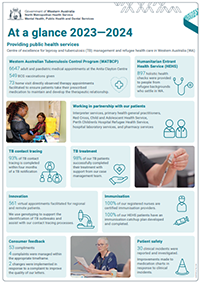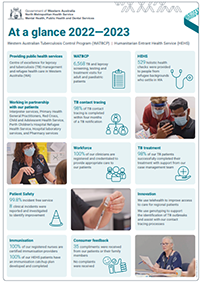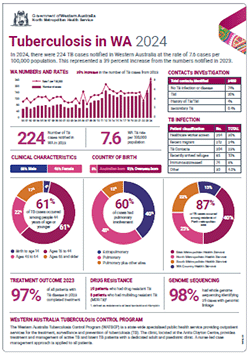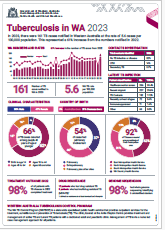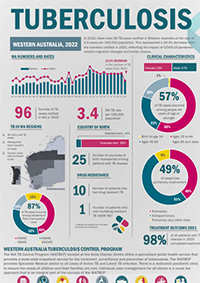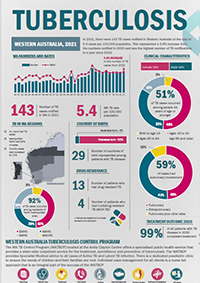WA Tuberculosis Control Program
The Western Australian Tuberculosis Control Program (external site) (WATBCP) provides a statewide outpatient public health service. The program accommodates the needs of adult and paediatric clients and promotes family-based care. Although the target clientele for the program is the entire community, emphasis is invariably on the following high-risk groups:
- People from high tuberculosis (TB) prevalence countries (especially migrants on health undertakings or of refugee status, residency applications, illegal entrants)
- People who have had contact with infectious TB
- Socially disadvantaged groups
- Those with medical conditions known to predispose to TB
- Special occupational groups (e.g. health care workers).
The program offers a comprehensive service such as a medical assessment, pathology collection, radiology (chest X-ray) and BCG vaccination (restrictions apply). Telehealth appointments are also available for patients located in Country WA. All clients suspected of having TB or on TB treatment are assigned a nursing case manager who provides support on an individual basis, ensuring effective care delivery through the implementation and evaluation of the case management plan.
BCG vaccine is recommended for specific groups at high risk of infection with TB or leprosy and is not part of the routine WA immunisation schedule. Information on BCG can be found on Healthy WA (external site). To request a booking for your child/children, please complete the BCG vaccination booking request form (external site)
Find out about the management of tuberculosis (TB) in Western Australia
Management of tuberculosis (TB) in Western Australia video transcript
Speaker 1
Tuberculosis (TB) is an infection. It's caused by a bacteria, a germ that is spread in the air.
Speaker 2
TB is passed on when someone who does not have TB breathes in the TB bacteria from someone who already has active TB disease in the lungs.
Speaker 1
It can cause a serious infection in the lungs. In about 70% of patients. But it can actually even spread beyond the lungs or any other part of the body.
Speaker 2
So there is two different types of TB. You have what we call active TB disease and latent TB infection. Active TB disease is when you are actually unwell with TB and you are showing signs and symptoms. With latent TB infections, we also call it sleeping TB because the infection is dormant in your body.
Speaker 1
The typical symptoms are in your lungs. So we say a cough that lasts for more than three weeks, if you might produce a bit of phlegm. And then you get symptoms outside of the lungs, which are very nonspecific but important, like slow weight loss, loss of energy, palatal sweats, low grade fever.
Speaker 2
So the TB control program is located here on the Anita Clayton Center in the city. We manage all cases of active and latent TB in Western Australia. That is looking after the patient, diagnosis, treatment and providing medication and what we call case management as well.
Speaker 1
The key test that tells you that might have TB, the chest x ray, which shows a shadow in the lungs and then a phlegm test or a sputum test, which where we grow the bug and that proves the infection.
Speaker 2
Once you've been diagnosed, the TB treatment has is then offered at that point in time. The doctor will discuss with you various options for what treatment may be suitable for you.
Speaker 1
We have case management nurses, and their one of their jobs is to support the patient and really ensure that they maintain the pills, taking them exactly as prescribed right through to the end, even once they start to feel better. If they stop them early, infection can reoccur and not just reoccur but be drug resistant and harder to treat.
Speaker 2
TB is curable if the medication is taken every day and taken correctly.
Speaker 1
They should not be afraid of seeking treatment. The treatment is difficult, but we support them. It's free of charge and there will be no consequences in terms of their visa or their stay in Australia or ability to work and so forth.
Speaker 2
So it's really important if you're told you have TB to come into the clinic and to see a doctor so that the treatment can be given because TB is curable.
Patient resources including translated resources
English
Frequently asked questions about tuberculosis (PDF)
TB Testing and Treatment poster (PDF)
BCG anti-tuberculosis vaccine (PDF)
Preventive treatment for tuberculosis infection (PDF)
Instructions for collecting sputum for tuberculosis (PDF)
Sputum Collection poster (PDF)
The Tuberculin Skin Test (PDF)
TB Medications Fixed Dose Combinations (PDF)
Isoniazid and Rifapentine (PDF)
العربية | Arabic
تتبع الاتصال | Contact Tracing (PDF)
الأسئلة المتداولة حول مرض السل | Frequently asked questions about tuberculosis (PDF)
العلاج الوقائي لعدوى السل | Preventive treatment for tuberculosis infection (PDF)
اختبار الجلد السلين | The Tuberculin Skin Test (PDF)
دواء السل | Tuberculosis Medication (PDF)
أدوية مرض السل مجموعات الجرعة الثابتة | TB Medications Fixed Dose Combinations (PDF)
မြန်မာ | Burmese
ခြေရာခံဆက်သွယ်ပါ။ | Contact Tracing (PDF)
တီဘီရောဂါကူးစက်မှုကို ကြိုတင်ကာကွယ်ကုသခြင်း။ | Preventive treatment for tuberculosis infection (PDF)
Tuberculin အရေပြားစမ်းသပ်မှု | The Tuberculin Skin Test (PDF)
တီဘီဆေး | Tuberculosis Medication (PDF)
တီဘီဆ ေးမ ေး ဆ ဆ ဆပေါင်ေးစပ်ဆ ေးမ ေး | TB Medications Fixed Dose Combinations (PDF)
简体中文 | Simplified Chinese
BCG抗结核疫苗 | BCG anti-tuberculosis vaccine (PDF)
关于结核病的常见问题 | Frequently asked questions about tuberculosis (PDF)
结核病感染的预防性治疗 | Preventive treatment for tuberculosis infection (PDF)
结核病痰液采集说明 | Instructions for collecting sputum for tuberculosis (PDF)
结核菌素皮肤试验 | The Tuberculin Skin Test (PDF)
结核病药物 | Tuberculosis Medication (PDF)
结核病 固定剂量复合制剂 药物 | TB Medications Fixed Dose Combinations (PDF)
دري | Dari
د تماس تعقیب | Contact Tracing
د نري رنځ په اړه ډیری پوښتل شوي پوښتنې | Frequently asked questions about tuberculosis (PDF)
د نري رنځ انفیکشن لپاره مخنیوي درملنه | Preventive treatment for tuberculosis infection (PDF)
د تیوبرکولین پوستکي ازموینه | The Tuberculin Skin Test (PDF)
د نري رنځ درمل | Tuberculosis Medication (PDF)
دواهای توبرکلو ز ترکیبات دوز ثابت | TB Medications Fixed Dose Combinations (PDF)
རྫོང་ཁ | Dzongkha
འབྲེལ་བ་ཞིབ་གཏང། | Contact Tracing (PDF)
ཊུབེརཀིུལིན སྐིན་ནིང་སྐད་དུ། | The Tuberculin Skin Test (PDF)
སྒྲིགས་འབྱོར་འཕྲུལ་སྤུའི་སྒུར་བཞི་སོ། | Tuberculosis Medication (PDF)
Tiếng Việt | Vietnamese
Vắc xin phòng bệnh lao BCG | BCG anti-tuberculosis vaccine (PDF)
Truy tìm liên hệ | Contact Tracing (PDF)
Những câu hỏi thường gặp về bệnh lao | Frequently asked questions about tuberculosis (PDF)
Điều trị dự phòng nhiễm trùng lao | Preventive treatment for tuberculosis infection (PDF)
Hướng dẫn lấy đờm cho bệnh lao | Instructions for collecting sputum for tuberculosis (PDF)
Xét nghiệm da Tuberculin | The Tuberculin Skin Test (PDF)
Thuốc chữa bệnh lao | Tuberculosis Medication (PDF)
Thuốc điều trị bệnh lao Thuốc hỗn hợp liều cố định | TB Medications Fixed Dose Combinations (PDF)
Reports and guidelines
Tuberculosis notifications in WA 2024 (PDF)
Tuberculosis notifications in WA 2023 (PDF)
Tuberculosis notifications in WA 2022 (PDF)
Tuberculosis notifications in WA 2021 (PDF)
Guidelines for Tuberculosis Control in Western Australia 2025 (PDF)
Guidelines for the diagnosis, management and prevention of leprosy (PDF)


